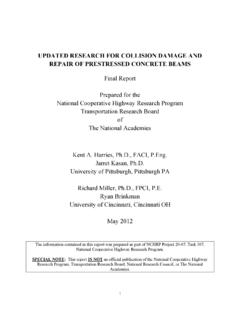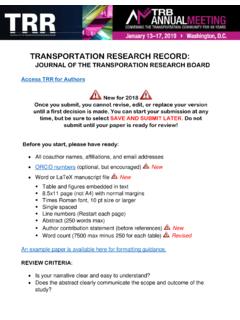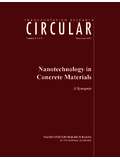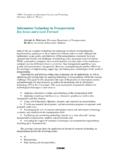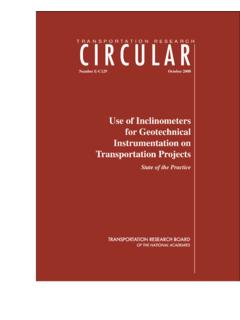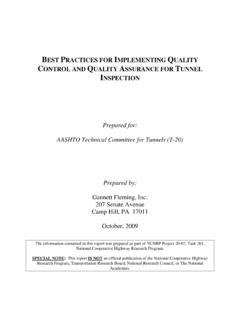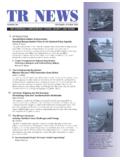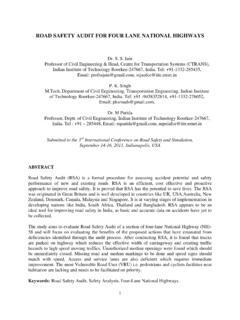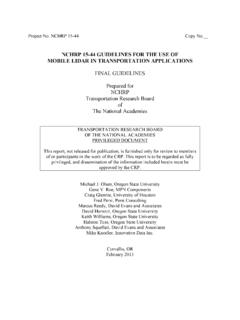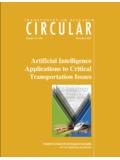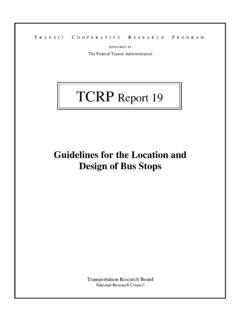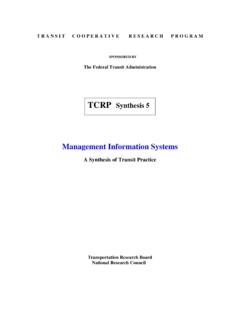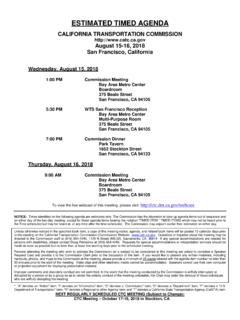Transcription of Sponsored by the Federal Transit Administration LEGAL ...
1 Transit cooperative research Program Sponsored by the Federal Transit Administration LEGAL research digest . June 1995--Number 4. Subject Areas: IA Planning and Administration ; IC Transportation Law; and VI Public Transit Transit Labor Protection--A Guide to Section 13(c). Federal Transit Act This report was prepared under TCRP Project J-5, " LEGAL Aspects of Transit and Intermodal Transportation programs , "for which the Transportation research Board is the agency coordinating the research . The report was prepared by G. Kent Woodman, Jane Sutter Starke, and Leslie D.
2 Schwartz. James B. McDaniel, TRB Counsel for LEGAL research , was the principal investigator and content editor. THE PROBLEM AND ITS SOLUTION Civil rights and labor standards; and Tort liability, risk management, and system In reauthorizing Federal assistance for surface safety. transportation programs through the 1990s, the Intermodal Surface Transportation Efficiency Act In other areas of the law, Transit programs may calls for the adaptation of new concepts and involve LEGAL problems and issues that are not shared techniques in planning, funding, constructing, and with other modes; as, for example, compliance with operating these programs .
3 These changes will affect Transit -equipment and operations guidelines, FTA. the institutional framework--laws and administrative financing initiatives, private sector programs , and processes--as well as engineering and operational labor or environmental standards relating to Transit elements of these programs . The nation's Transit operations. Emphasis would be on research of current agencies need to have access to a program that can importance and applicability to Transit and intermodal provide authoritatively researched, specific, operations and programs .
4 Limitedscope studies of LEGAL issues and problems having national significance and application to their APPLICATIONS. businesses. The TCRP Project J-5 is designed to provide insight into the operating practices and LEGAL Section 13(c) of the Federal Transit Act is an elements of specific problems in transportation especially complex Federal requirement. It has a agencies. unique history, which must be appreciated. It is The intermodal approach to surface administered by two Federal agencies, primarily the transportation requires a partnership between Transit Department of Labor (DOL) and secondarily the and highways, and in some instances, waterways.
5 To Department of Transportation (DOT), which do make the partnership work well, attorneys for each not always share the same policies or interpretations. mode need to be familiar with the LEGAL framework Decisions regarding Section 13(c) are not generally and processes of the other modes. research studies in published. areas of common concern will be needed to determine what adaptations are necessary to carry on This report provides descriptions of how the successful intermodal programs . Section 13(c) certification process works. It should Transit attorneys have noted that they share be a reference for attorneys, Transit administrators, common interests (and responsibilities) with highway labor representatives, comptrollers, Transit planning and water transport agencies in several areas of and grant officials, Metropolitan Planning transportation law, including Organizations, and local officials.
6 Environmental standards and requirements;. Construction and procurement contract procedures and Administration ;. _____. TRANSPORTATION research BOARD. NATIONAL research COUNCIL. CONTENTS. 3. INTRODUCTION AND OVERVIEW .. 3. I. BACKGROUND OF SECTION 13(C) LABOR PROTECTION .. 4. A. Statutory 4. B. Legislative History of Section 13(c) .. 4. C. Historical Perspective--Labor Protections in the Railroad Industry .. 6. D. Common Elements of Section 13(c) Agreements .. 6. E. Nature and Source of Section 13(c) Guidance .. 8. II. THE SECTION 13(C) PROCESS AND PROCEDURAL ISSUES.
7 9. A. The Section 13(c) Certification Process .. 9. B. Section 13(c) Process for "Standardized" Protections .. 13. C. The Section 13(c) Claims 14. III. THE SUBSTANTIVE LAW OF SECTION 13(C)--MAJOR ISSUES AND DECISIONS .. 15. A. Scope of Protected 15. B. Scope of Key Definitions .. 16. C. Relationship to State 17. D. Scope of DOL Authority .. 17. E. Conditional 18. F. Interest Dispute 19. G. Notice and Implementing 20. H. New Jobs 21. I. Contracting Out--Sole Provider Clause .. 21. J. "Carryover" Rights and Change in Contractors .. 22. K. Successor 24.
8 L. Worsening Benefits .. 25. IV. CONCLUSION .. 25. ENDNOTES .. 26. 3. FOREWORD Transit LABOR PROTECTION--A GUIDE TO SECTION 13(C) Federal . Transit ACT. As a precondition or prerequisite to a grant of Federal assistance by the Federal Transit Administration (FTA), Section 13(c) of the Federal Transit Act requires that "fair and By G. Kent Woodman, Jane Sutter Starke, Leslie D. Schwartz equitable" protective arrangements must be made by the grantee to protect employees affected by such assistance. Under the provisions of Section 13(c), the Secretary of Labor is given Attorneys at Law authority to determine what is fair and equitable, and certifies to the FTA that such protections Eckert Seamans Cherin & Mellott are in place before grant funds are released.
9 The process for obtaining such a certification, and Washington, the substantive requirements and interpretations of the law, are described in this report. Historically, the origins of Federal financial support of mass Transit date back to the INTRODUCTION AND OVERVIEW. 1960s. Legislation was introduced in Congress in 1962 that would have supported urban rapid Transit through capital grant assistance. This legislation did not achieve support from important Section 13(c) is quite well known in the Transit industry as the labor protection provision groups, including the labor and automobile lobbies, and it was defeated.
10 The labor groups were of the Federal Transit Act. Despite the general awareness of Section 13(c) requirements, its concerned about the possible loss of jobs and possible loss of rights that had been gained interpretation and application have long been a source of uncertainty and even confusion through collective bargaining, if private Transit companies were taken over by municipalities among Transit managers and lawyers. It is the goal of this paper to shed light on the procedural and other public entities. Because several states prohibited collective bargaining by public and substantive aspects of Section 13(c).
